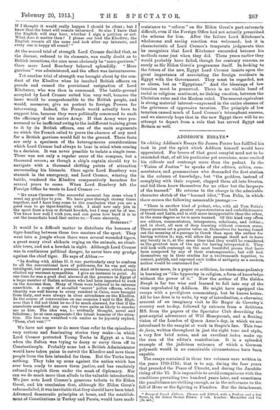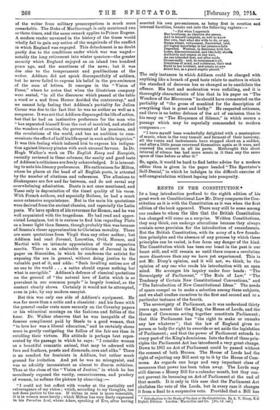ADDISON'S ESSAYS.•
IN editing Addison's Essays Sir James Frazer has fulfilled his task in just the spirit which Addison himself would have appreciated. For lovers of that great essayist need not to be reminded that, of all his particular pet aversions, none excited his ridicule and contempt more than the pedant. In the "Vision of Justice" he speaks of the editors, critics, com- mentators, and grammarians who demanded the first station. in the column of knowledge; brit "the goddess, instead of complying with their request, clapped them all into liveries, and bid them know themselves for no other but the lacqueys• of the learned." He returns to the charge in the admirable character sketch of the "learned idiot," Tom Folio, in which.. there occurs the following memorable passage " There is another kind of pedant, who, with all Tom Folie'e impertinencies, bath greater superstructures and embellishments of Greek and Latin, and is still more insupportable than the other. in the same degree as be is more learned. Of this kind very often are editors, commentators, interpreters, scholiasts, said critics: and in short, all men of deep learning without common sense. These persons set a greater value on themselves for having found out the meaning of a passage in Greek than upon the author for having written it; nay, will allow the passage itself not to have • any beauty in it, at the same time that they would bo considered, as the greatest men of the age for having interpreted it. They will look with contempt on the moat beautiful poems that have+ been composed by any of their contemporaries ; but will lock themselves up in their studies for a twelvemonth together, to correct, publish, and expound such trifles of continuity as a modern, author would be contemned for."
And once more, in a paper on criticism, he condemns pedantry in learning as "like hypocrisy in religion, a form of kuowledge • without the power of it Now the author of The Golden. Bough is far too wise and learned to fall into any of the vices reprobated by Addison. He might have equipped the essays with a prodigious commentary, but he knows better•.. All he has done is to write, by way of introduction, a charming account of an imaginary visit to Sir Roger 19 Coverley'a country seat to-day, followed by extracts from a fietitieue. MS. from the papers of the Spectator Club describing Um post-nuptial adventures of Will Honeycomb, and a fleeting vision of the London of Queen Anne's day, in which we aro- introdueed to the essayist at work in Staple's Btu. This tour. de force, written throughout in just the right tone and styles a very few brief notes, and an excellent index make up, the sum of the editor's contribution. It is a splendid, example of the judicious reticence of which a German polymath would in no conceivable circumstances have been, capable.
The essays contained in these two volumes were written in the years 1709-1716; that is to say, during the four year& that preceded the Peace of Utrecht, and during the Jacobite rising of the '15. It is impossible to avoid comparisons with the, conditions prevailing two hundred years later, and sometime* the parallelisms are striking enough, as in the references to the fall of Mons or the fighting iu Flanders. But the detachment, • Essays of Joosph Addison. Chown and Edited, with a Protect, and a few Noes, by sir lames George Fraaer. I vole. London: Macmillan and Co. [ft. net.] of the writer from military preoccupations is much more remarkable. The Duke of Marlborough is only mentioned two or three times, and the same remark applies toPrince Eugene. A modern reader unversed in the history of the times would wholly fail to gain any notion of the magnitude of the conflict in which England was engaged. This detachment is no doubt partly due to the conditions under which war was waged— notably the long retirement into winter quarters—the greater security which England enjoyed as an island two hundred years ago, and the scantiness of the news; but it was due also to the temperament and predilections of the writer. Addison did not speak disrespectfully of soldiers, but he never failed to express his belief in the pre-eminence of the Irian of letters. It emerges in the "Vision of Fame," where he notes that when the illustrious company were seated, "in all the discourse which passed at the table a word or a nod from Homer decided the controversy," and we cannot help feeling that Addison's partiality for Julius Caesar was due to the fact that he was an author es well as a conqueror. It was not that Addison disparaged the life of action, but that he had an instinctive preference for the man who " has separated himself from the rest of mankind, and studied the wonders of creation, the government of his passions, and the revolutions of the world, and has an ambition to com- Inanimate the effect of half his life spent in such noble inquiries." It was this feeling which induced hini to express his indigna- tion against literary pirates with such unusual fervour. In Dr. Hugh Walker's work on The English Essay and Essayists, recently reviewed in these columns, the sanity and good taste of Addison's criticisms are freely acknowledged. It is interest- ing to note his literary preferences. His enthusiasm for Milton, whom he places at the Lead of all English poets, is attested by the number of citations and references. The allusions to Shakespeare are few and far between, and do not reveal any overwhelming admiration. Dante is not once mentioned, and Tasao only in depreciation of the tinsel quality of his verse. With French authors, and especially Boileau, he had a much more extensive acquaintance. But in the main his quotations were derived from the ancient classics, and especially the Latin poets. We have spoken of hie reverence for Homer, and he was well acquainted with the tragedians. He had read and appre- ciated Longinus, but it is curious to find him regarding Plato as a lesser light than Seneca, though probably this was because of Seneca's closer approximation to Christian morality. There are more quotations from Virgil than any other author; but Addison had read Juvenal, Lucretius, Ovid, Horace, and Martial with an intimate appreciation of their respective remits. There is an admirable criticism of Juvenal in the caper on Simonides, in which he condemns the satirist for -exposing the sex in general, without doing justice to the valuable part of it, and adds: "Such levelling satires are of no use to the world . . . a satire should expose nothing but what is corrigible." Addison's defence of classical quotations an the ground of "the natural love of Latin which ie no prevalent in our common people" is largely ironical, as the context clearly shows. Certainly it would not be attempted, even in joke, by any modern essayist.
But this was only one side of Addison's equipment. He was far more than a critic and a classicist and his fame with the general reader rests more securely on the Coverley papers or his whimsical musings on the fashions and follies of the boar. Dr. Walker observes that he was incapable of the famous compliment paid by Steele to a good woman, that "to love her was a liberal education," and he certainly shone more in gently castigating the follies of the fair sex than in extolling their virtues. His attitude is perhaps best repre- sented by the passage in which be says : "I consider woman as a beautiful romantic animal, that may be adorned with furs and feathers, pearls and diamonds, ores and silks." There is no comfort for feminists in Addison, but rather much ground for irritation. And yet he was no misogynist, and was so adroitly inconsistent as almost to disarm criticism. Thus at the close of the " Vision of Justice," in which lee has mercilessly exposed the vanity, censoriousness, and prudery of woman, he softens the picture by observing
" I could not but reflect with wonder at the partiality and extravagance of my vision ; which, according to my thoughts, has not done justice to the sex. If virtue in neon is more venerable, it is in women more lovely ; which Hilton has very finely expressed in his Paradise Lost, where Adam, speaking of Eve, after having asserted his own pre-eminence, as. being first in creation sad internal faculties, breaks out into the following rapture
• —Yet when I approach
Her loveliness, so absolute ahe seems. And In herself complete, so well to know Her own, that what she wills to do, or my, Seems wisest, virtuousest, discreetest, best. All higher knowledge in her preaencetills Degraded. Wisdom, is discourse with her, Loses, discountenanced, and like folly allows. Authority and reason on her wait, As one intended first, not after made Occasionally : and, to consemmate all, Greatness of mind, and nobleness, their seat Build in her loveliest, and create an awe About her, as a guard angelic placed.' "
The only instances in which Addison could be charged with anything like a breach of good taste relate to matters in which the standard of decorum has so changed as to annihilate the offence. His tact and moderation were unfailing, and it is thoroughly characteristic of him that in his paper on "The Wonders of the Microcosm" he should have commented on the partiality of "the gross of mankind for the description of everything that is great and bulky." He respected reticence, and there is no better defence of the art of omission than in his essay on "The Eloquence of Silence," in which occurs a passage which may be especially commended to modern composers :—
" I have myself been wonderfully delighted with a masterpiece of music, when in the very tumult and ferment of their harmony, all the voices and instruments have stopped short on a sudden, and after a little pause recovered themselves again as it were, and renewed the concert in all its parts. Rethought this short interval of silence has had more music in it than any the same space of time before or after it."
So, again, it would be hard to find better advice for a modern editor than is given in the paper headed " The Spectator's Self-Denial," in which he indulges in the difficult exercise of self-congratulation without lapsing into pomposity.







































 Previous page
Previous page